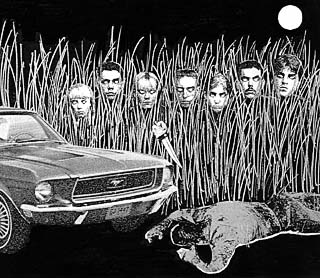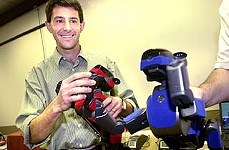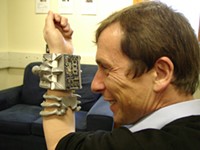Scary Movie
'Kids' Director Larry Clark Takes On Real Teen Horror in 'Bully'
By Sidney Moody, Fri., July 27, 2001

Most people who have heard of Larry Clark probably know him as the director of Kids -- a tale of teenage lust and self-destruction set in New York City, featuring a script by Harmony Korine. But Clark asserted his dark sensibilities at least three decades before the 1995 release of that movie, when he published Tulsa, a haunting and unsettling visual essay of junkies in rural Oklahoma from the mid-Sixties to the early Seventies. (Tulsa was published as a book in 1971; it can be viewed in 8x12 prints at the Harry Ransom Center, 21st & Guadalupe.) This was a scene that Clark, a former heroin addict who once did time in a penitentiary for shooting someone, knew all too well.
In one of Tulsa's photographic sequences, we are shown a vivacious and attractive young woman. The next photograph shows her contorted and haggard, as if in heroin withdrawal. There is still another image of the same woman sitting in a darkened living room, again contorted, looking across the room at a luminous lampshade with almost religious yearning. Tulsa contains a Grand Guignol punch line of sorts, with the last image of an infant in a tiny coffin preceded by a pregnant woman injecting herself with heroin (a scenario echoed in Kids, when a character breastfeeds while smoking a cigarette). In retrospect, it seems only natural that Clark would shoot movies, as Tulsa became the template for a slew of projects by more established movie directors, most notably Gus Van Sant's Drugstore Cowboy.
Kids, Clark's film debut, was a sensation at the Sundance Film Festival and went on to win the Palme d'Or at the Cannes Film Festival. Clark was suddenly an established and bankable filmmaker. His sophomore effort was the strangely neglected Another Day in Paradise (1998), starring James Woods and Melanie Griffith as junkie grifters mentoring two younger versions of themselves on the lam. It is a perverse pleasure to watch these two old pros tearing up the scenery in such an unconventional film. But although the film vanished from the theatres after a week or two, it at the very least expanded Clark's range. It proved that he could make a crime thriller if he wanted to, minus the talents of Korine (who is reportedly not in a working relationship with Clark anymore, but is credited with writing the script for Ken Park, Clark's fourth film, to be released early next year).
Clark's third film and current release, Bully, continues to explore teenhood and violence, this time in the process of telling a story based in real events. In 1993, a clique of teenagers in South Florida killed their friend and apparent bully Bobby Kent. The Broward County Seven (as the group of convicted teenagers is now known) are now serving time. Bully is based on investigative reporter and Dallas Observer columnist Jim Schutze's book of the same name.
Bully combines the adolescent angst of Kids with the crime-thriller elements of Another Day in Paradise. The characters here seem to be less interested than the teens in Kids in getting laid (albeit just barely) as they make their descent into a maelstrom of violence. The steamy South Florida location, with its sand crabs and crocodiles, provides an interesting counterpoint to the endless sagas of alienated Southern California youth. Gone is the scrappy, low-budget look of Kids as well. Bully is a sleek and stylish crime thriller with a sparkling ensemble cast of some of the busiest young actors in Hollywood.
In addition to the groundswell of controversy over the film's inability to get an R rating (Bully is being released unrated), there have been questions raised over the validity of the story as presented by Schutze. A Web site (www.freelisaconnelly.com) dedicated to encouraging the release of Lisa Connelly (one of the convicted teens) loudly denounces both Schutze's book and Clark's film. In response to the controversy, Schutze has launched his own Web site (www.jimschutze.com) in defense of his book.
Clark spoke to the Chronicle about the film by telephone from his home in Los Angeles.
Austin Chronicle: You have two movies coming out: Bully and Ken Park.
Larry Clark: They are totally different stories. Bully is about these kids in Florida who killed their friend who was a bully. Ken Park is about relationships between parents and children in Southern California.
AC: [Actor] Brad Renfro was arrested during filming for trying to steal a yacht. Were you able to channel this juvenile-delinquent edge of his personality into his characterization of Marty, a high school dropout with sadistic as well as masochistic tendencies?
LC: Brad is such a talented young actor. He's intuitive -- a natural actor. He's not Marty at all. He's a very talented actor who's able to bring himself to the role. I don't think that what you're talking about has anything to do with how he played the role.
AC: Would you care to comment on the allegations that Bully is more a work of fiction and bears little resemblance to the people who are portrayed and the events that actually took place?
LC: The movie is based on the book Bully: A True Story of High School Revenge by Jim Schutze, who's an investigative reporter, so it says on the book. It's straight from the book. Everything in the movie is straight from the book.
AC: You ditched the script?
LC: The script was based on the book -- but the book was better. The screenplay left a lot of stuff out, and I basically went to the book and shot straight from the book.
AC: In Jungian psychology, there's a phenomenon known as the "Scapegoat Complex," which is derived from the ancient tradition where nomadic herdsmen would sacrifice a goat in an attempt to project their own transgressions onto the goat. Watching Bully made me think that the characters in the story were unconsciously acting out this ritual. Did you have any ideas along these lines when you were preparing to shoot the film?
LC: No, I wasn't thinking about that at all. That's really interesting. It's just a very complex relationship that these kids had. What I felt was interesting was the relationship between Bobby and Marty. It was so strange and so complex and there were so many things going on. It was almost like an abusive spousal relationship where one member was getting abused but couldn't walk away. And Bobby and Marty were such a couple of knuckleheads, they had all these things going on. They posed as a gay couple and they would go to a gay club and hustle gays. It was just strange all the different things that they did. And I was always fascinated by the other kids. Why were they there? Half of the kids who took part in this had never even met Bobby Kent. They didn't know him at all. And if you read the book -- all the kids have fascinating backstories. And you could have probably done a movie about any of them.
AC: The French film director Robert Bresson had an affinity for young people. Do you have an affinity for Bresson?
LC: He was a good filmmaker, but I really didn't think about him at all. I always liked John Cassavetes a lot. Sam Peckinpah -- I like his films. I think more in terms of those guys. But I've been doing work about adolescents for a long time. The scripts I see too -- people send me a lot of scripts that are always about kids. Since I did that film Kids, that's kind of what I get. But I'm actually writing my own screenplay now.
AC: Can you tell us about it?
LC: No -- not yet.
AC: Your movies often show naked teenagers having sex, and yet they don't seem to be pornographic. They seem to be an exercise in a banality of eroticism.
LC: I'm not romanticizing what was going on with these kids at all. It's part of what they were doing. I'm just trying to reflect some kind of reality.
AC: Do you feel personal responsibility for "heroin chic?"
LC: I was doing documentary work. I wasn't selling clothes. These people are selling clothes. I have nothing to do with fashion photography. Commercial photography and advertising have a long history of ripping off the artist. It's all about making money and selling clothes. But having said that -- if what I did was that influential through no design of my own -- that if I'm influencing people. I mean, how many people influence other people? If I'm influencing that many people, I guess I do have some kind of responsibility not to be blind to it, even though I want to have nothing to do with it. But if that is the case, I'll take some responsibility and try to do good work and try not to sell out. I don't want to give anybody the wrong idea. I don't want to hurt anybody. And if somebody is out there looking at my work and maybe influenced by it, then I want to do the best work that I can so that if they are influenced, at least they aren't influenced in the wrong way.
AC: So you don't plan to do any BMW commercials?
LC: No one has offered me one.
AC: i-D magazine mentioned that you once did a River Phoenix collage.
LC: I actually did a little artist book. Handmade. It was an edition of three. He was a good actor. I wanted to work with him, but he was gone before I got a chance to.
AC: In Naked Lunch, William Burroughs describes Buddha as "a notorious metabolic junky ... So Buddha says: 'I don't hafta take this sound. I'll by God metabolize my own junk.'" Are you metabolizing your own junk these days?
LC: I'm pretty happy right now. I'm not doing junk. I'm working really hard and I'm happy and healthy. I think that I'll probably do more work and better work than I've probably ever done before.
AC: Sounds like you are metabolizing your own junk.
LC: Yeah, I am. ![]()
Bully opens in Austin on Friday, July 27. See Film Listings for review.










